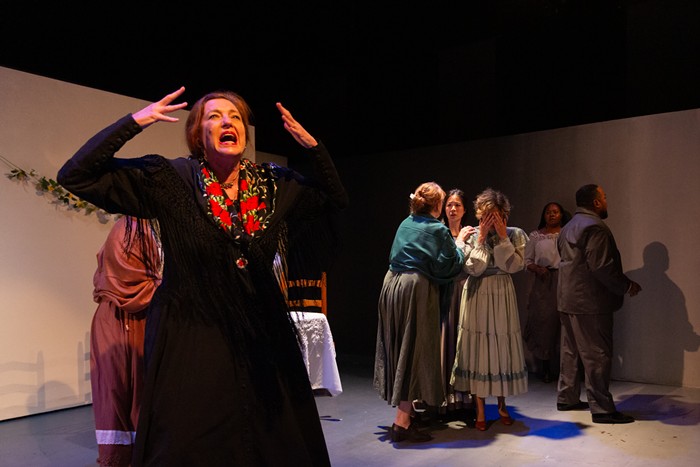
When confronted with something as prosaic as a lecture in the TBA lineup, particularly from a figure as iconoclastic as the legendary “drag terrorist” Vaginal Davis, one could be forgiven for expecting an ambush—a smashed paradigm, a knife to the heart of convention, or any of the other violences that contemporary art threatens to inflict on tamer, more traditional practices.
But Vaginal Davis—“Vag” to her friends, per TBA co-curator Kristen Kennedy’s introduction to the piece—promised a lecture, and a lecture she gave. For her presentation of Sassafras, Cypress & Indigo—Black Screen Images and the (e)motive Notion of Freakiness, Davis took the audience on a brief exploration of the question “What is Black American freakiness?”
Reading from notes written on the backs of old headshots, she used her own artistic career as a framing device to talk about the notion of the Black “freak” in relation to punk rock and film. Veering from sharp cultural commentary (“the abandonment of an anti-capitalist platform is what killed true countercultural movements”) to gentle self-mockery (“I love making these declarations… I’m a declarations queen!”), Davis’ presentation offered academic inquiry with an IDGAF twist. One minute she’s on about the heteronormative reproductive paradigm; the next, she’s reminding us that “butt babies never come to term.” Supplementary sources came in the form of clips from her own film work as well as the 1970s exploitation films Petey Wheatstrawand Mandingo. A syllabus wouldn’t have been out of place.

At Wednesday night’s presentation, Davis apologized repeatedly for her jetlag, and it’s easy to imagine a livelier version of this lecture that was less tied to cue cards and that featured more of the winning quips and asides with which she occasionally broke things up. The whole audience sat up eagerly when she told us about the time she did “psychosexual conversion therapy” on a suburban neo-Nazi, and we all slumped in slight disappointment when she dismissed the topic as a story for “another day.”
If, all told, Davis gave a surprisingly straightforward presentation, it was also a worthwhile and thought-provoking one. And perhaps after all there’s something subversive after all about an artist as defiantly outsider as Davis making her own life and work the subject of inquiry.
We'll be blogging about TBA 2018 every day of the fest! Keep up with us at: portlandmercury.com/tba


















